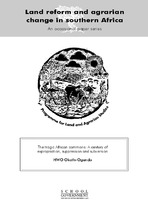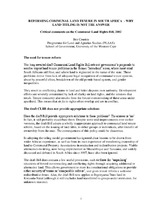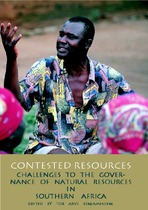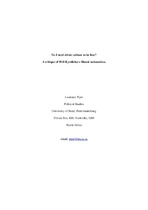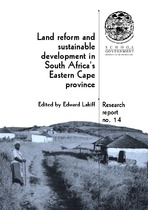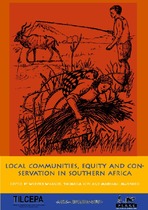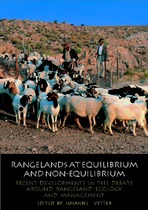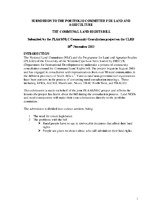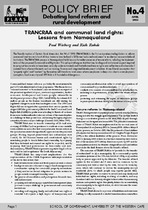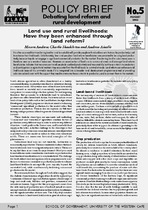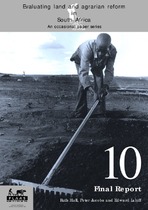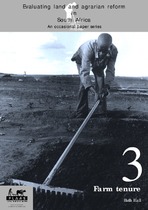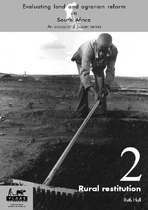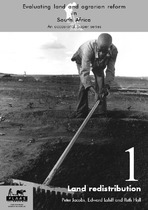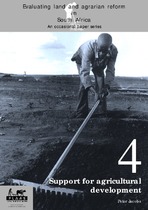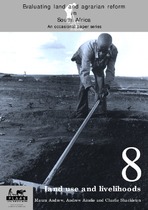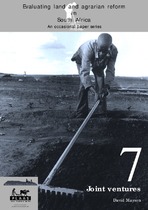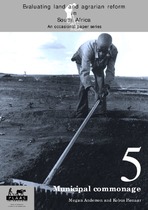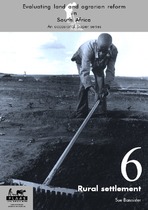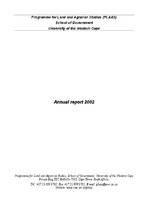Browsing Faculty of Economic and Management Sciences by Issue Date
Now showing items 41-60 of 1094
-
The tragic African commons: A century of expropriation, suppression and subversion
(Institute for Poverty Land and Agrarian Studies (PLAAS), 2002)This paper examines the nature of the African commons as a property system; analyses the extent of damage which was inflicted upon it during one hundred years of exploitation, suppression and subversion; explains why, in ... -
Reforming communal land tenure in South Africa – Why land titling is not the answer
(Institute for Poverty, Land and Agrarian Studies, University of the Western Cape, 2002)The long-awaited draft Communal Land Rights Bill sets out government’s proposals to resolve urgent land tenure problems in the former ‘homeland’ areas, where most rural South Africans still live, and where land is ... -
Contested resources: Challenges to the governance of natural resources in Southern Africa
(Institute for Poverty Land and Agrarian Studies (PLAAS), 2002)Papers from the International Symposium on ‘Contested Resources: Challenges to Governance of Natural Resources in Southern Africa. Emerging perspectives from Norwegian-Southern African collaborative research’ held at The ... -
Do I need ethnic culture to be free? A critique of Will Kymlicka's liberal nationalism
(AJOL, 2002)As part of a vigorous debate about the politics of multiculturalism, Will Kymlicka has sought to find grounds within liberal political theory to defend rights for cultural groups. Kymlicka argues that the individual's ... -
Land reform and sustainable livelihoods in South Africa's Eastern Cape province
(Institute for Poverty, Land and Agrarian Studies, University of the Western Cape, 2002)The Eastern Cape is one of the nine provinces of South Africa, located in the south-east of the country along the Indian Ocean seaboard. The area was a site of prolonged struggle between native peoples, principally Xh ... -
Local communities, equity and conservation in southern Africa: A synthesis of lessons learnt and recommendations from a southern African technical workshop
(Institute for Poverty Land and Agrarian Studies (PLAAS), 2003)This publication reports on a technical workshop entitled ëCommunities and Conservation in Southern Africa: Key Issues and Challenges towards a more Equitable and Sustainable Futureí, which was held on 26ñ28 February 2003 ... -
Rangelands at equilibrium and non-equilibrium recent developments in the debate around rangeland ecology and management
(Institute for Poverty, Land and Agrarian Studies, University of the Western Cape, 2003)The debate on equilibrium vs non-equilibrium dynamics in pastoral systems emerged in the early 1980s, when economists, ecologists and social scientists began to challenge the widespread claims of overgrazing and degradation ... -
Submission to the portfolio committee for land and agriculture: The communal land rights bill
(Institute for Poverty Land and Agrarian Studies (PLAAS), 2003)The National Land Committee (NLC) and the Programme for Land and Agrarian Studies (PLAAS) of the University of the Western Cape have been funded by DfID UK (Department for International Development) to undertake a process ... -
TRANCRAA and communal land rights: Lessons from Namaqualand
(Institute for Poverty, Land and Agrarian Studies, University of the Western Cape, 2003)The Transformation of Certain Rural Areas Act, Act 94 of 1998 (TRANCRAA) is the first comprehensive legislation to reform communal land tenure in South Africa. It aims to transfer land in 23 former coloured rural areas ... -
Land use and rural livelihoods: Have they been enhanced through land reform?
(Institute for Poverty, Land and Agrarian Studies, University of the Western Cape, 2003)It is often assumed that transferring land to rural households will provide people with valuable assets that can be productively used to enhance their livelihoods. Unfortunately, few rural people or land reform beneficiaries ... -
Evaluating land and agrarian reform in South Africa : Final Report
(Institute for Poverty Land and Agrarian Studies (PLAAS), 2003)Land dispossession was a key feature of racism under colonial rule and apartheid in South Africa. More than 3.5 million people were forcibly removed in the period 1960 to 1983 alone, through homeland consolidation, removals ... -
Evaluating land and agrarian reform in South Africa : Farm tenure
(Institute for Poverty Land and Agrarian Studies (PLAAS), 2003)Farm dwellers are among the poorest South Africans. Most have access to residential land only. A minority has access to grazing land for their livestock or to arable land for cultivation, in return for which they may be ... -
Evaluating land and agrarian reform in South Africa : Rural restitution
(Institute for Poverty Land and Agrarian Studies (PLAAS), 2003)During the negotiated transition to democracy, many South Africans expected that liberation would bring the return of land they had been dispossessed of under colonialism and apartheid, but the terms on which the transition ... -
Evaluating land and agrarian reform in South Africa : Land redistribution
(Institute for Poverty Land and Agrarian Studies (PLAAS), 2003)Land dispossession during the colonial era and the decades of apartheid rule produced a highly unequal pattern of land ownership and widespread rural poverty in South Africa. When a democratically elected government came ... -
Evaluating land and agrarian reform in South Africa : Support for agricultural development
(Institute for Poverty Land and Agrarian Studies (PLAAS), 2003)In South Africa, land reform has to be more than securing land rights and transferring a certain number of hectares to black people. Broadly speaking, it has to take into account the uneven spatial development patterns ... -
Evaluating land and agrarian reform in South Africa : Land use and livelihoods
(Institute for Poverty Land and Agrarian Studies (PLAAS), 2003)This paper addresses how land reform can contribute to enhancing land-based livelihoods. South African agriculture is often characterised as being divided into two types: freehold tenure/ commercial agriculture vs. ... -
Evaluating land and agrarian reform in South Africa : Joint ventures
(Institute for Poverty Land and Agrarian Studies (PLAAS), 2003)Joint ventures (JVs) are an increasingly common feature of the process of land and agrarian reform in South Africa. They involve black people who currently have land rights or who are land reform beneficiaries and will be ... -
Evaluating land and agrarian reform in South Africa : Municipal commonage
(Institute for Poverty Land and Agrarian Studies (PLAAS), 2003)This paper compares the performance of the Municipal Commonage Programme of the Department of Land Affairs (DLA) with the objectives stated in the White Paper on South African Land Policy (DLA 1997). This paper will review ... -
Evaluating land and agrarian reform in South Africa : Rural settlement
(Institute for Poverty Land and Agrarian Studies (PLAAS), 2003)The primary focus of South Africa is land reform programme is the acquisition of land and tenure security. The policies and strategies attached to this programme have provided many people with land. However, access to land ... -
Annual report 2002
(Institute for Poverty Land and Agrarian Studies (PLAAS), 2003)The year 2002 was an extremely busy one for PLAAS staff, and saw the initiation of many new projects and activities, some of them qualitatively different to anything undertaken before. These included an in-depth, national ...

